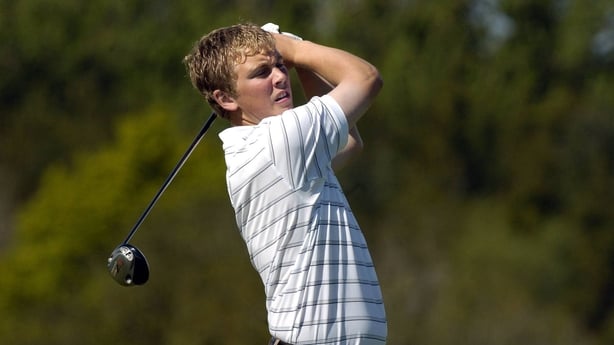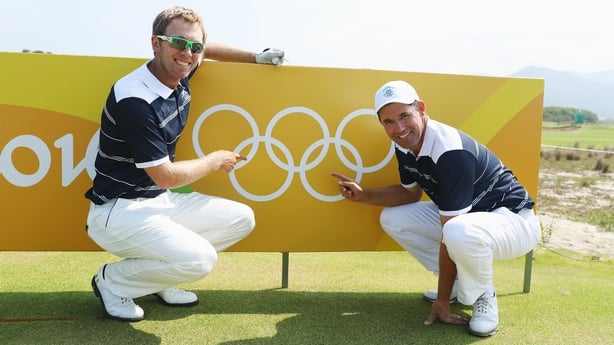The first time Seamus Power invaded the consciousness of the mainstream Irish golf fan was at the 2016 Olympics, when he was the largely unknown beneficiary of Rory McIlory and Shane Lowry's professed wariness about the Zika virus.
Then a Korn Ferry Tour (or Web.com Tour) player, Power represented Ireland at the inaugural Olympics golf tournament in Rio alongside Padraig Harrington. And thus two would-be accountants became Ireland's first golfing Olympians.
Harrington qualified as an accountant while competing on the amateur circuit in the early 90s. Power was bound for the course in UCC until a man from East Tennessee spied him in Italy and offered to whisk him across the Atlantic on a scholarship.
Fred Warren was on a talent finding expedition at the 2005 European Boys Team Championship in Monticelli. Rory McIlroy, around whom there was already growing buzz, was his original target. Warren told McIlroy the scholarship was his if he wanted it. He decided he didn't.
Rebuffed, Warren turned his attention to Power. As with the Olympics, Power benefitted from McIlroy opting out. While not considered as hot a property as Rory, Power was in the midst of an impressive youth career. He won three Irish Youth Championships in four years between 2005 and 2008, the final one by a whopping 11 strokes at Lisburn Golf Club when he was already based in the US.

In particular, the Tennessee talent scout was hugely taken by the Waterford lad's gung-ho, swaggering, American-like approach to the game. He sensed that Power's game was more suited to the parkland courses which predominate in the US, rather than the links-heavy Irish amateur scene.
"He had an American style game, a long hitter, aggressive, trying to make birdies. I was real impressed with him," Warren later told the New York Times.
On Thursday, Power becomes the 12th Irishman to tee it off at the Masters - and he is comfortably the one who has taken the most exotic route to Magnolia Lane.
While Irish golf entered a golden era in the late 2000s/early 2010s, with nine major championships claimed in the space of eight years, Power, out of sight, was slogging away in total anonymity on the underling tours in the States.
He spent a few seasons on the brutally unglamorous eGolf Tour, essentially the third tier of the US professional golfing landscape, where costs outweigh prize-money and the sole aim is to escape the scene to a higher Tour. In these straitened times, Power leaned on Irish Sports Council funding to help keep the dream alive.
Altogether, he won four events on the eGolf Tour, two apiece in 2012 and 2014, finishing second on the money list in the latter year. Q-school was the main event, the primary focus in those years. In 2014, he made a critical leap, finishing fifth in Q-school and earning his Web.com Tour card.
The Web.com Tour - originally the Ben Hogan Tour and since re-named the Korn Ferry Tour - is the secondary tour in the States and the main avenue through which players break onto the big-time Tour.
Power flourished in his new environment. Even then he was breaking new ground. Four months before his Rio adventure, he became the first and only Irish golfer to win on the Korn Ferry Tour, winning the 2016 United Leasing and Finance Championship.
The following August, he teed off in Rio. A final round of 67 lifted Power above his decorated compatriot and into a tie for 15th spot. To the casual golf fan, he had risen - as was once said of Bertie Ahern - without trace.
Finishing ninth in Web.com Tour, the second tier tour, in 2016 - the only non-American in the top 10 - Power was ushered inside the velvet ropes of the PGA Tour for 2016-17.
Scrapping to retain his place there would be the chief pre-occupation over the coming years. His first few months were a relative triumph, with only six missed cuts in his first 25 events, and an early top-10 in the Canadian Open in March 2017.

Interest began to ratchet upwards, Power's progress each week now being noted in the media back home. Slowly but steadily, 'How did Power do?' would sidle up behind 'How did Lowry do?' and 'How did Rory do?' as the standard query after a night's golf in the States.
In 2017-18, he preserved his PGA Tour card in nerve-jangling fashion, securing the 25th and final spot in the Web.com play-offs money list by a mere $287. He wouldn't be so lucky the following year, losing his full playing privileges after a difficult 2019 season.
It could have marked the end but turned out to be a modest enough speed bump. A few sessions with Bob Rotella at the beginning of last season worked wonders. The 2020-21 season, in which he played 17 PGA Tour events, would be a landmark one for Power. There was increased consistency across the board, with four top-10s, seven top-25s.
As is the way with golf tournaments, word filtered through late last July that Power was right in the hunt at the Barbasol Championship in Kentucky. The Johnny-Come-Latelys rushed to the Sky channel in question - or flicked on NowTV on their laptops - to catch the bizarrely protracted finale. Power, after a superb final round of 67, benefitted from JT Poston's late collapse to enter what turned out to be a marathon play-off.
Sudden death from the outside, it took six holes to separate them, Power holing out from the fringes with his pitching wedge before Poston drained a 10 footer at one stage. On their sixth run up the 18th (well, seven if you include the fourth round itself), Poston blinked, pushing his drive into the lake down the right-hand side. From there, Power could relax, a few minutes later, the tap-in par would hand him a first PGA Tour victory.
Six playoff holes later, @Power4Seamus is a winner @BarbasolChamp. pic.twitter.com/dv0M8CuyFU
— PGA TOUR (@PGATOUR) July 19, 2021
"This changes everything for me," he acknowledged in his post-victory interview just off the 18th green. "Forever, now I'll be able to say I'm a winner on the PGA Tour." Originally a curiosity, the apparent late-bloomer with the hybrid Waterford-American accent had become one of the fixtures of the Irish sporting landscape.
The 2021-22 season has seen Power ascend to a higher plane again. Between Christmas and February, Power amassed six top-15 finishes in a row and appeared to be in contention practically every week. Masters entry was looming large on the horizon but Power hit a rough patch with three missed cuts in February, throwing into doubt his Augusta invite.
But he re-grouped. A reasonable showing at the Players Championship - albeit where he was overshadowed by his caddy Simon Keelan's world-beating talent with upside down irons - steadied the ship, three-under par for the tournament notching him a tied-33rd finish.
His play returned to January levels at the World Matchplay a fortnight ago. He demolished Sungjae Im, Patrick Cantlay and Tyrrell Hatton en route to the quarter-finals, where he was forced to give second-best to the ludicrously in-form Scottie Scheffler. At that stage, his position inside the world's top-50 was already locked in in time for the Masters.
And so, at the age of 35, Power makes his opening bow in major championship golf at the most sacred venue in the sport, the eyes of those back home now at last paying full attention.


